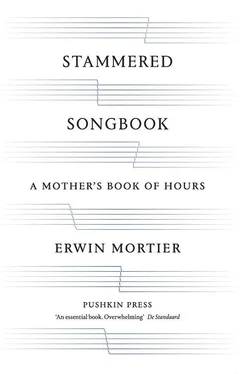She whines because she is afraid she’ll have to go back in the car (in the car she’s quiet, says my father), and because she’ll again be dragged from pillar to post all day long, out of the car, into the house, into the car, because he can’t stand being alone with her and her decay (and you can’t ask him to stay at home the whole time).
She whines with misery, with fear, with grief. With the rage that she takes out on his upper arm with her impotent blows. She whines because she’d like to be quiet somewhere, but that somewhere doesn’t exist.

I’d rather not imagine, but I do anyway: her walking doglike after him, the only person she still recognizes and on whom she fixates like a dove on the dovecote. Him first putting her on the sofa, picking up the vacuum cleaner again, but then giving up after she comes trailing after him for the umpteenth time.
The macabre dance of the two of them behind the vacuum cleaner round the table, she getting her feet caught in the cable and falling to the floor. Her crying. The blood. His feeling of guilt. The doctor.
I call back and ask: how can you stand it, I’m all in after a quarter of an hour.
He says: It’s not that bad, I can take it.

Was that absent-mindedness of hers always a portent? How many times did she sprinkle sugar instead of salt on the beefsteak and fail to understand why the gravy turned to caramel? Afternoons when the smell of burnt potatoes wafted towards us as soon as we reached the garden gate — countless. The house was an ordeal for indoor plants: languishing leaves over dried-out clods of compost — while the cactus drowned. In her hands the wash was a bureaucratic nightmare. Shirts, missing for weeks, suddenly turned up again — or disappeared without trace.
What else has she covered up? Was it always there? Are the meshes in her brain now becoming fatally wide? Was it written in her nerve cells, from the beginning?

Christmas Eve, the first Christmas since it became visible. Tarrying in the kitchen, to give the impression that she is lending a hand; her fingers with the knife in them linger above the onion and the chopping board. She studies the onion, the knife and the chopping board. Finally she puts the knife down, takes a tea towel and rubs the work surface clean with it for the umpteenth time, then the edge of the kitchen unit.
We say nothing, ignore it, and roll our eyes. Wondering: does she know? Is she keeping up appearances for herself?

Or did it begin (when do these things begin?) when we noticed that she was mesmerized by the toddlers’ programme on television? With childlike fascination she watched the puppets sliding across the screen, the colourful, constantly changing chequerboard patterns, the dancing, opening and closing parasols.
I like that, she said, these days.

They were going to visit friends. She stands in front of the bathroom mirror flabbergasted: a white mask stares out at her with her own terrified eyes. She tries to wipe it off but simply rubs the white further over her cheeks, her forehead and her nose. She looks at her fingers, at the tube, at her fingers again. She comes into the kitchen like that.
This is funny face cream I bought, she says.
Mum, says one of my sisters, that’s toothpaste.

If a word does not come immediately to mind, I think: it’s started. If I find the salt cellar in the fridge after hunting for several minutes, I panic. This afternoon I was having a pee and I saw that I had put my pen in the mug on the shelf over the washbasin, with the toothbrushes.

They have one last trip together, with a couple they know, to Asia to visit her oldest brother. The doctors think she can manage that.
In their absence my sisters find the house in a state of disorder. Old washing stuffed into the unused washing machine. Secreted washing-up full of dry crusts, waiting for soap and suds.
How long has he been hiding all kinds of things from us?
Meanwhile, on the other side of the world she is shocking the company with attacks of rage, fear and complete derangement. In the plane she won’t sit still. She scolds her best friend, thinking that she fancies my father.
Everything is crumbling.
On the beach, as she watches the bronzed, horny young people on the silver sand under the palms, she makes as if to lift her skirt and cries out despairingly: look, I can’t do it any more. I can’t do it any more.
Later in the photos I see that she’s gone. Fog in her eyes. A look I don’t recognize. What’s become of her?
In the following months it goes from bad to worse. The blonde with which she colours her hair grows out, making way for grey. She loses weight visibly. In the winter months she literally shakes with cold. Overnight she is a woman in her late eighties.
At each new collapse we swallow, and make the best of it.
Sometimes we wonder: us too? Soon? When?

It goes like a flash, decay. If we had imagined a slow decline, at a pace that would be more or less bearable for my father, as far as that is possible, we can lay that dream to rest. In the space of a few weeks the remnants of self-awareness or consciousness that were in her have vanished. It is as if you’re looking from the top of a cliff at a huge whirlpool, as if I am embracing an hourglass of skin and bone. The erosion is unstoppable and horrifying.
The panic in her eyes, it is as if she is watching the house around her being emptied by a gang of looters, too perplexed and powerless to stop them. Hands grabbing everywhere. We’ve scarcely turned our backs, so to speak, before the thieves have made off with yet another word or a habit.
Sometimes she sits shaking on the sofa, I don’t know if it’s from fear or grief, or is she cold because her internal thermostat has gone haywire?
I look at her, she looks back, with a helplessness that cuts you to the quick. I hear the rustling of the rats behind the panelling, gnawing at her nerves.
A friend whose mother also had Alzheimer’s once said: it’s the most cowardly, sneakiest disease I know. It wrung my mother out like a floorcloth and slung her in a corner.
I can hear it giggling, the disease, behind the cupboard, under the table, in a cowardly tone.
Another friend told me about a woman who kept going at home by sticking self-adhesive labels everywhere, on the doors, on cupboards and other furniture, with words like “soup plates”, “cups” or “beer glasses” on them.
I wondered: does she stick a label on her blouse too, with “Me” on it in mirror writing, so that she knows who it is who bends over the washbasin in the mornings to freshen her face? And how long will it be before she no longer knows what reading is — like my mother; panicking in a whirlpool of labels that have come loose?
Читать дальше













